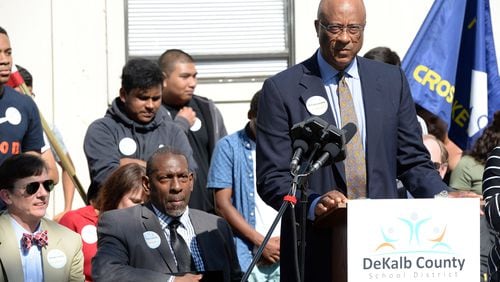Melvin Johnson has seen the DeKalb County School District through different chapters since beginning as a teacher in 1968.
Then, DeKalb was the crown jewel of the state’s education system, a wealthy district with a waiting list of educators clamoring for the state’s highest-paying teacher jobs.
It also was the year a class-action lawsuit sought to force the district out of segregation.
“It was an exciting time,” he said.
When Johnson was approached to run for the DeKalb County Board of Education in 2011, he said he talked it over with his wife and they decided if he won, he would sit through four years, or two two-year terms.
He spent six years there instead. That time included four years as board chairman, a job he began just weeks into his board service, after Gov. Nathan Deal removed six board members amid allegations of mismanagement and general malfeasance, leaving Johnson and two other newly elected members, current Vice-Chairman Marshall Orson and Jim McMahan, who is also leaving the board this month after six years.
Johnson answered questions recently for The Atlanta Journal-Constitution about his time on the board and the ever-evolving school district.
You actually retired from the school system as an administrator (2004). What made you run for the board in 2012?
I remember when I left in 2004, I made a statement to the administrators that I was not leaving the county, I would still be a resident, and if I was ever needed, let me know. In 2011, there were some situations that occurred that called for individuals to approach me and ask if I would run for the board. I was aware of the history and issues that needed some attention. I couldn’t go back on my word.
How was the district when you retired compared to when you first started?
My first year in the school district was 1968. As a result (of Pitts v. Cherry, which ended school segregation in DeKalb Schools), that was the implementation phase of closing some black schools, redirecting those students to majority schools and many opportunities and services on race relations and student relations. That was an exciting time. Financially, we were a very wealthy school district. Money was never an issue. As we grew, we had the highest salaries in the state. We had a waiting list of teachers over the years. Attracting new teachers was never a problem.
In what ways was the district different then from when you retired?
When I left the school system, we had our problems, but they were not as severe. Of course, the recession had not hit. Financially, we were in good shape, we had a change of superintendents and everything was moving in the right situation.
What went through your mind when Gov. Deal removed the six veteran board members?
We have to educate the community on how we can work through this. We had no control over his decision to remove the board members, but we could educate the community on following through the necessity of educating the nine board members and create a working relationship among the collegial relationship. My thought was the strategy on doing that. Whatever we do should be centered around creating a culture to better educate boys and girls and putting them first.
Of which achievements are you most proud?
I'm most proud of being part of a school district with all these parts, floating parts, and being able to bring a systems approach to problem-solving and creating solutions. It was very transparent.
Any regrets?
I can truly say I don’t have any regrets at all because I was part of a moving system — and a system accelerating in a successful way, up to now. What happened between 1968 and 2012, 2013, I could use that experience and share with board members the importance of collaboration and working out problems. DeKalb has always been able to wade through issues to get the best of what DeKalb has to offer. That can only be done through people.







